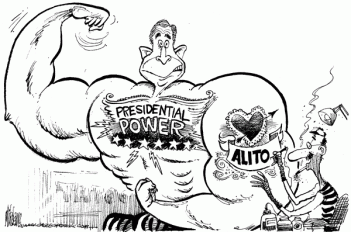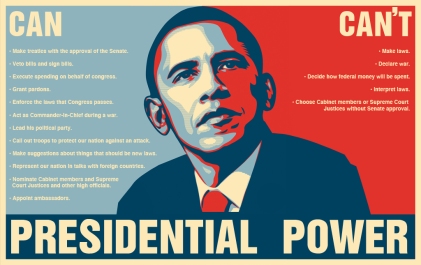Too Powerful?
 A question is often raised in today’s politics, “Is the President of the United States too powerful?” Many people will defend both sides of this argument based on their political beliefs. In government class the past two trimesters, all students have developed their own opinion on the question presented. There is a big bias factor that plays into this because many students are Republican or just oppose President Barack Obama. For this bias reason, many of my classmates would say, “Yes, the President of the United States is in fact way too powerful!” Another question that could be raised because of the biasness is, “What if it was not Obama in office? Would the President then have too much power?” These questions along with other Presidential responsibilities will be debated frequently in the up coming months leading up to the Presidential election in November.
A question is often raised in today’s politics, “Is the President of the United States too powerful?” Many people will defend both sides of this argument based on their political beliefs. In government class the past two trimesters, all students have developed their own opinion on the question presented. There is a big bias factor that plays into this because many students are Republican or just oppose President Barack Obama. For this bias reason, many of my classmates would say, “Yes, the President of the United States is in fact way too powerful!” Another question that could be raised because of the biasness is, “What if it was not Obama in office? Would the President then have too much power?” These questions along with other Presidential responsibilities will be debated frequently in the up coming months leading up to the Presidential election in November.
This question of too much power has also changed since our Founding Fathers first outlined the responsibility of the presidency. The Founding Fathers deliberately set up a system of government that relies on the tension of preserving a series of checks and balances that are vital to its success. We have learned these past two trimesters in class what the requirements are to qualify to run for President and the jobs once elected President. To run for President, one must be at least 35 years of age, be a native-born American citizen, and had lived in the United States for 14 years. Also, once elected, it is the primary duty of the President to make sure all United States laws are carried out and that the federal government is run effectively. Many United States citizens today do not realize that the importance of the jobs that are required by the President. We read in class an excerpt of Clinton Rossiter’s, The American Presidency, which showed us Rossiter’s ten roles of modern presidents. These ten roles consist of Chief Executive, Commander-in-Chief, Chief of State, Protector of the Peace, Chief of Party, The Voice of the People, World Leader, Chief Diplomat, Chief Legislator, Manager of Prosper. All of the roles that involve the President of the United States are of great importance to the executive branch as well as the citizens of America.
The modern day Presidential roles are very different from past Presidential roles and they continue to change. The roles of the President have dramatically changed in that the President has and continues to gather different responsibilities in which he is not responsible for, according to our founding fathers. Due to the way America and its society are shaped today, the President of the United States is forced to take on new jobs in which he was not signed up to do. In accepting these new responsibilities, we as Americans must ask ourselves again, “is the President of the United States too powerful?”
 It is in my belief that the President of the United States is too powerful. According to a survey, Scott Rasmussen says, “75 percent of Republicans believe the federal government has too much power over the states while a plurality of Democrats (37 percent) believe the balance is about right. Among those not affiliated with either major party, 50 percent say the federal government has too much influence while 11 percent say not enough.” This survey supports my belief that the President of the United States in fact has to much power. I believe that the President’s main purpose is to protect and serve the people. However, with the many responsibilities that the President is faced with it is hard for the President to focus on protecting and serving the people.
It is in my belief that the President of the United States is too powerful. According to a survey, Scott Rasmussen says, “75 percent of Republicans believe the federal government has too much power over the states while a plurality of Democrats (37 percent) believe the balance is about right. Among those not affiliated with either major party, 50 percent say the federal government has too much influence while 11 percent say not enough.” This survey supports my belief that the President of the United States in fact has to much power. I believe that the President’s main purpose is to protect and serve the people. However, with the many responsibilities that the President is faced with it is hard for the President to focus on protecting and serving the people.
